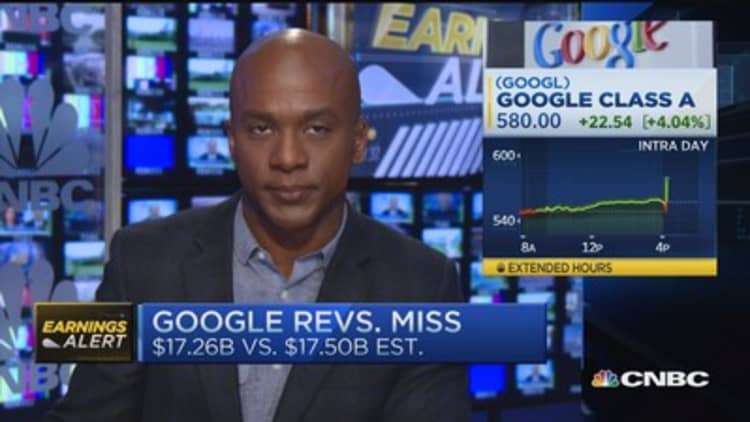
Google reported quarterly earnings, revenue and advertising metrics that missed analysts' expectations on Thursday.
The company posted first-quarter earnings per share of $6.57, compared to $6.27 a share in the year-earlier period. Revenue for the quarter came in at $17.26 billion, against the comparable year-ago figure of $15.42 billion.
Analysts had expected Google to report earnings of about $6.60 a share on $17.50 billion in revenue, according to a consensus estimate from Thomson Reuters.
Read MoreGoogle Fiber: Super fast Internet coming to more cities
Still, the stock rose more than 3.5 percent in after-hours trading immediately after the earnings figures were announced, and wavered little as traders digested the numbers and subsequent conference call with executives.
The Internet giant said the first quarter saw a 13 percent year-over-year gain in aggregate paid clicks. Analysts had expected a 14.8 percent gain, according to StreetAccount.
Source: Google earnings slides
Google's aggregate cost-per-clicks (the average price for its online ads) fell 7 percent year-over-year, the company said, while the StreetAccount consensus had only expected a 1.9 percent decline.
"The pay-per-clicks decline was really a bit disappointing. I was hoping they would at least be able to maintain margins. We need to hear better numbers coming out of Google," Surevest Wealth Management's Robert Luna told CNBC's "Closing Bell."
During the earnings call, Google executives said that site cost-per-click figures would actually be growing if not for YouTube's skippable TrueView advertisements.
The company pointed in part to currency exchange, saying in its earnings release that revenue grew "a healthy" 17 percent from the year-ago period, excluding the net impact of foreign exchange. With currency taken into account, that revenue growth was only 12 percent year-over-year.
Read MoreYikes! What I learned from my Google search history
"This quarter, Google turned in a strong performance, and this despite substantial currency headwinds," CFO Patrick Pichette said on the firm's earnings call.
He said that a strong U.S. dollar led to a gross negative currency impact on revenues of $1.1 billion for the quarter.
Capital expenditure for the first-quarter came in at $2.93 billion; analysts had expected $2.49 billion, according to StreetAccount.
"The thing to look at here—what might have the stock up—is that people might start to get some insight here that perhaps the company is going to get religious on controlling their expenses and start managing for profit margins, which I think people wanted to see for a long time," said David Garrity of GVA Research.
Google's advertising revenue has been pressured as more consumers access its online services on mobiles devices such as smartphones and tablets, where ad rates are typically lower.
Ad sales in the first quarter rose 11 percent year-over-year to $15.51 billion.
Read MoreGoogle's biggest product hits and misses
The company, under increasing competition for mobile advertising dollars from rivals such as Facebook, tweaked its algorithm for mobile searches on Tuesday to favor sites that look good on smartphone screens.
"It's very evident that Facebook is taking share. The question is to what extent was Google engaging with them seriously," Garrity said.
Pichette denied that growth trends in Google's clicks and cost-per-clicks were "primarily" due to difficulties monetizing mobile search.
Omid Kordestani, Google's chief business officer, said on the call that the shift to mobile poses an important opportunity for the company, citing a figure that more than 8 in 10 smartphone users research a product they're about to buy while in stores.
"People expect to get exactly what they want when they want it," he said. "As a company built on intent and immediacy, that's good news for Google."
During their earnings webcast on Wednesday, Facebook executives also focused heavily on mobile opportunities.
As for another competitor, Google executives deferred an analyst question on Google Wallet versus Apple Pay to a discussion of the payment sphere opening to the wider public.
Earlier this week, the launch of a new wireless service that will enable customers to pay only for the data they use and use Wi-Fi networks to curb data use and keep phone bills low.
The service, Google's first entry into the wireless industry, will work only on the company's Nexus 6 phones and will be hosted through Sprint and T-Mobile's networks, Google said in a statement.
The phones will also be able to switch between the two networks, depending on which signal is stronger. The network, called Project Fi, will cost $20 a month plus $10 per gigabyte of data used.
Google is also planning to expand its Google Fiber Internet service, which could have implications for businesses across the country.
Pichette described Fi as a serviced-based solution to drive Internet innovation, whereas Google Fiber is an asset-based play.
—Reuters contributed to this report.


